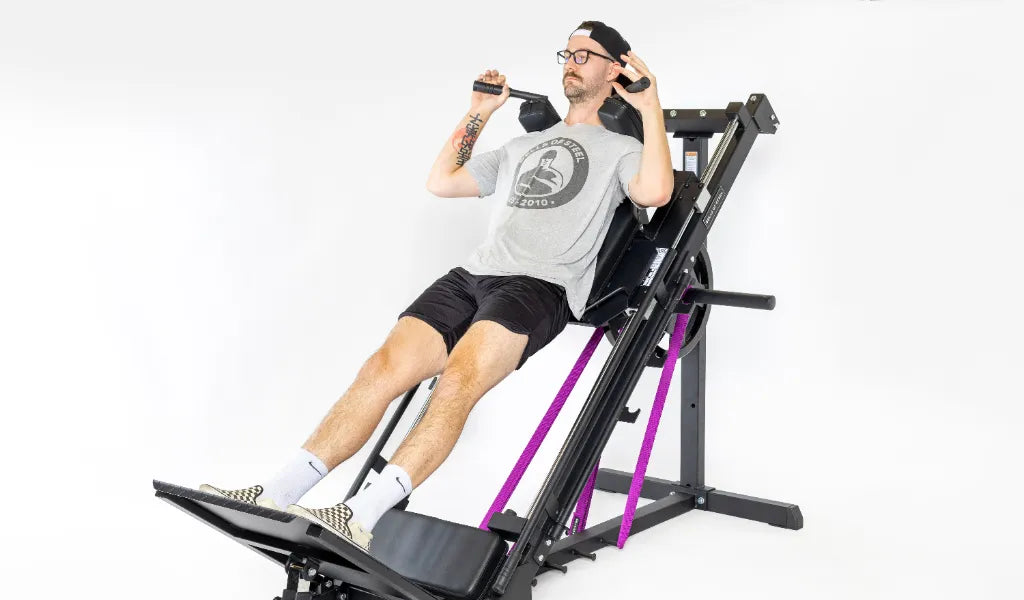But is that really true? Or are they just being knee-jerk reactions? (Sorry, I couldn't resist.)
Hack squats are a type of strength equipment that allow you to target your quadriceps. They're also easier on your lower back and spine, since you don't have to balance a barbell on your shoulders.
But what about your knees — do hack squats put too much stress on your knee joints and cause pain or injury?
Well, the answer is not so simple. It depends on a lot of factors, such as your intensity, your weight selection, your frequency, and your individual anatomy and history.

Pain Is Complex
First of all, pain is not just a physical sensation. It's also influenced by your emotions, beliefs, expectations, and context. Pain can be your body's way of telling you that something is wrong, but it doesn't always mean that there's actual damage or harm.
For example, if you touch a hot stove, you'll feel pain and pull your hand away. That's a good thing, because it prevents you from getting burned. But if you have chronic pain, such as arthritis or fibromyalgia, you might feel pain even when there's no obvious cause or threat. That's not so good, because it interferes with your quality of life and well-being.
As it relates to exercise, pain is often from doing too much of a movement before your tissues have adapted to the exercise. This is called overloading. Overloading is not necessarily bad, because it stimulates your muscles, bones, tendons, and ligaments to grow stronger and more resilient. But if you overload too much or too often, without enough recovery time, you might experience pain.
Knee Pain on Hack Squats? Try This.
So what does this mean for hack squats and knee pain?
Well, if you experience knee pain on any squat variation, it doesn't necessarily mean that you should eliminate that exercise from your routine. It might just mean that you need to scale back the weight, sets, and/or total squatting-related exercises during your training week. Observe your symptoms, then add more work when your knee pain has subsided.
Of course, this also depends on the severity and duration of your pain. If you have acute or severe pain that lasts for more than a few days or weeks, or if you have signs of infection or trauma (such as swelling, redness, fever, or bruising), you should see a doctor or physiotherapist for a proper diagnosis and treatment.
But if you have mild or moderate pain that comes and goes with exercise, you might be able to manage it yourself with some simple strategies:
- Warm up properly before each workout. Do some dynamic stretches and mobility drills to lubricate your joints and prepare your muscles for the main exercises.
- Start with lighter weights and higher reps. Start with the empty hack squat machine, then gradually increase the weight and lower the reps as you feel more comfortable and confident.
- Reduce your range of motion. If the bottom half of your hack squats cause you knee pain even with lighter weights, you can shorten the range of motion to ¾ or ½ of the full version. As your knee pain subsides, reintroduce more range of motion.
- Vary your squat stance and foot position. Experiment with different widths and angles to find what works best for you. Some people prefer a narrower stance with their feet pointing forward, while others prefer a wider stance with their feet turned out slightly.
- Rest and recover between workouts. Give yourself at least 48 hours of rest before doing another squat session. Use this time to do some low-impact activities (such as walking, cycling, swimming) or some gentle stretching and massage to improve blood flow and reduce stiffness.
Hack Squats Can Be GOOD For Your Knees
When done with appropriate weight and intensity, hack squats can actually be good for your knees because they'll strengthen your quadriceps, knee tendons, and supporting ligaments to better equip you for the daily physical demands of life.
Hack Squat Knee Pain Final Thoughts
Hack squats are not bad for your knees, as long as you load and increase them sensibly. They can actually help you build stronger and healthier knees that can handle any challenge.
Just always remember to listen to your body, adjust your training accordingly, and seek professional help if needed!




